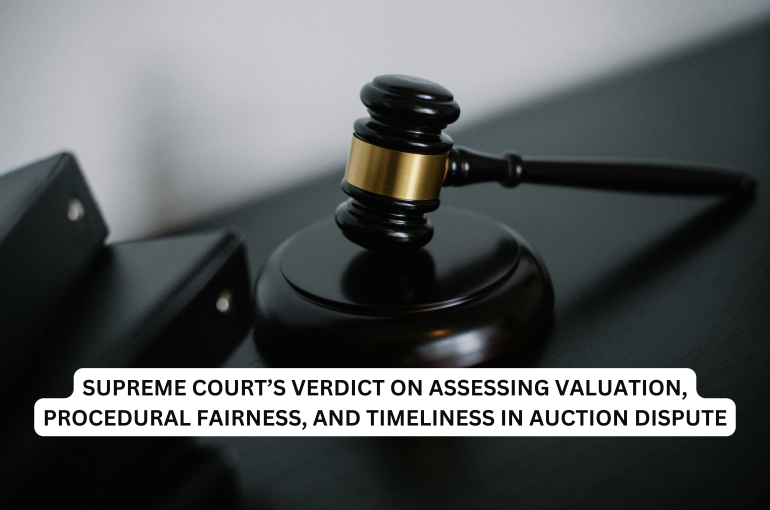SUPREME COURT’S VERDICT ON ASSESSING VALUATION, PROCEDURAL FAIRNESS, AND TIMELINESS IN AUCTION DISPUTE
Introduction:
In the Supreme Court of India, a Division Bench lead by Justice Dipankar Datta decided on a matter pertaining to the Ahmednagar District Central Cooperative Bank Ltd. (Appellant) and the State of Maharashtra (Respondent) regarding an auction sale.
The present matter of the Ahmednagar District Central Cooperative Bank Ltd. v. The State of Maharashtra and Ors. [CIVIL APPEAL NO. 8343 OF 2024] [Arising out of SLP(C) NO. 16901 OF 2024] was filed by the Appellant challenging the Judgement and Order of the High Court of Judicature at Bombay, Bench at Aurangabad pertaining to the sale of immoveable property of Mula Sahakari Soot Girni Ltd, Rahuri (Society).
The impugned Judgement was challenged by way of the SLP, under the following grounds:
- that valuation of the property of the society (under liquidation) and the upset price were fixed on the lower side; and
(ii) that three bidders had not participated in the auction sale. The High Court did not find substance in any of these two grounds. Incidentally, the High Court recorded that no mala fide could be attributed in respect of the questioned auction sale and that the auction purchaser was not a private individual, but a body established under the statute, i.e., the Agricultural Produce Market Committee (APMC), Rahuri.
Facts:
A loan of Rs 95 lakh was sanctioned by the Appellant, to the Society. In 2001, default in liquidating the debt occurred and a case under section 91 of the Maharashtra Cooperative Societies Act, 1960 (the Act), was lodged by the Appellant before the Registrar of Cooperative Societies for the recovery of ₹1,05,98,710/-.
An award of the claimed recovery amount along with an interest starting from October 2000, @17.5 % p.a. was granted to the Appellants.
The liquidation proceedings began and in the year 2005, the Additional Registrar directed for the winding up of the Society. The District Collector was appointed the liquidator of the Society and was authorised to take action under the Section 105 of the 1960 Act.
The Government approved the valuation of the immoveable property of the Society that was valued at Rs. 4.10 crores in the year 2012.
In the year 2013, an auction sale was held by the Appellant for the sale of the property with an upset price[1] of Rs. 4.10 crores. Respondent no 6 showed interest in the property by submitting an earnest bid of Rs 25 lakhs. However, the sale process couldn’t be finalized as no other bid was received. Due to this, Respondent no 6 backed out from the auction and requested the Appellant to return the earnest money of Rs. 25 Lakhs.
As the auction wasn’t concluded the amount recoverable by the Appellant from the debtor swelled upto Rs. 3,95,08,840/-.
The Appellant repeatedly submitted claims to the Liquidator, but no response was received. Fresh valuation was conducted in 2015, valuing the property at ₹2.47 crore. An e-auction was held on May 25, 2016, where APMC Rahuri emerged as the highest bidder, offering ₹2.51 crore. The Appellant challenged the auction process, alleging undervaluation and procedural irregularities.
Supreme Court’s Analysis
The Supreme Court acknowledged that there was a significant difference between the 2012 valuation of ₹4.10 crore and the 2016 valuation of ₹2.47 crore. However, the Court noted that the Appellant had notice of the valuation as early as February 2016 but failed to challenge it at that stage. The Court emphasized that prices of immovable properties typically appreciate over time, and the Appellant ’s inaction during the critical period was detrimental to its case.
The Hon’ble Court agreed with the Appellant that there were procedural irregularities, particularly in the publication of corrigenda related to the postponement of auction dates. The lack of adequate publication may have limited the participation of potential bidders. However, the Court noted that the Appellant was aware of the auction process and the upset price but chose not to challenge it at the appropriate time.
The Hon’ble Court found no substantial evidence to support the Appellant ’s allegations of mala fide actions by the authorities or APMC Rahuri. The Court held that mere suspicion of favoritism, without concrete proof, could not invalidate the auction process. Moreover, the Appellant had not named any specific individuals in its writ petition to support its claims of mala fides.
The Hon’ble Court was critical of the Appellant ’s delay in challenging the auction. The Court observed that even after the auction sale was conducted on 25th May, 2016, the Appellant did not immediately question the sale before the High Court. The writ petition was ultimately filed on 19th August, 2016, as the Appellant was engaged in obtaining information. The Court emphasized that writ petitions from indolent litigants are discouraged, especially when third-party rights have accrued.
Judgment
The Supreme Court, while dismissing the appeal, refused to interfere with the auction sale in favor of APMC Rahuri. However, exercising its powers under Article 142 of the Constitution to do complete justice, the Court directed APMC Rahuri to pay the Appellant a sum of ₹1,05,98,710/- (without interest) within three months.
This amount represented the dues owed to the Appellant by the Society as on the date of the initial award in 2011. The Court further held that if the amount was not paid within the stipulated time, it would carry simple interest at the rate of 6% per annum.
In addition, the Court allowed the Liquidator to disburse the balance amount of ₹29,78,499/- to other creditors or to the Appellant if no other creditors remained unpaid.
Ashita
Associate
The Indian Lawyer & Allied Services.
[1] The minimum price at which a seller of property will entertain bids.





































Leave a Reply